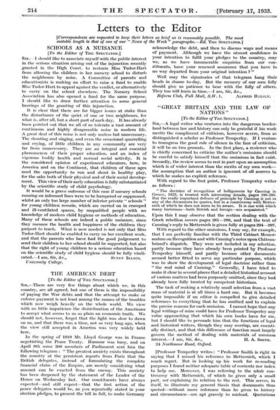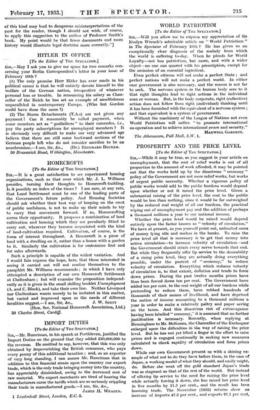"GREAT BRITAIN AND THE LAW OF NATIONS"
[To tlw Editor of THE SPECTATOR.]
Sia,—A legal writer who ventures into the dangerous border- land between law and history can only be grateful if his work merits the compliment of criticism, however severe, from to distinguished a scholar as Professor Temperley. If I venture to transgress the good rule of silence in the face of criticism, it will be on two grounds. In the first place, a reviewer who is chiefly concerned to criticise the author's omissions should be careful to satisfy himself that the omissions in fact exist. Secondly, the review seems to rest in part upon an assumption which is of wider interest than the merits of my own work— the assumption that an author is ignorant of all sources to which he makes no explicit reference.
With regard to the first point, Professor Temperley writes as follows :
" The doctrine of recognition of belligerents by Canning in Greece, 1823, is treated with interesting details, pages 288-290. But the really important defence of principle by Canning is not in any of the documents he quotes, but in a controversy with Metter- nich of which he does not seem to be aware. It is ono with which many historians—both British and foreign--aro aoquainted."
Upon this I may observe that the section dealing with the Greek rebellion covers pages 281-298, and that the text of Canning's reply to Metternich is given fully at pages 294-291.
With regard to the other omissions, I may say, for example, that I am perfectly familiar with the Third Cabinet Memor- andum on Recognition and with Canning's notes upon Chateau- • briand's dispatch. They were not included in my selection, partly because they have already been printed by Professor Temperley himself, and partly because other documents seemed better fitted to serve my particular purpose, which was to show the development of legal doctrine rather than "the real mind of Canning." Generally, I have tried to make it clear in several places that a detailed historical account of various matters had been purposely omitted, since they had already been fully treated by competent historians.
The task of making a relatively small selection from a vast mass of material is at all times a hard one. But it becomes quite impossible if an editor is compelled to give detailed references to everything that he has omitted and to explain the precise reasons for each omission. I cannot hope that any legal writings of mine could have for Professor Temperley any value approaching that which his own books have for me, but I should like to persuade him that the functions of legal and historical writers, though they may overlap, are essenti- ally distinct, and that this difference of function must largely govern the method of dealing with materials of common interest.—! am, Sir, &c., IL A. SHIT/I. 24 Northnwor Road, Oxford.
[Professor Temperley writes : "Professor Smith is right in saying that I missed his reference to Metternich, which I much regret. But in looking up his work for re-reading purposes I found neither adequate table of contents nor index to help me. Moreover, I was referring to the whole con- troversy with Metternich, of which he gives only a small part, not explaining its relation to the rest. This serves, in itself, to illustrate my general thesis that documents thus quoted—without more reference than he gives to history and circumstance—are apt gravely to mislead. Quotations of this kind may lead to dangerous misinterpretations of the past for the reader, though I should not wish, of course, to apply this suggestion to the author of Professor Smith's book. My point would be that fewer documents and more history would illustrate legal doctrine more correctly."]







































 Previous page
Previous page